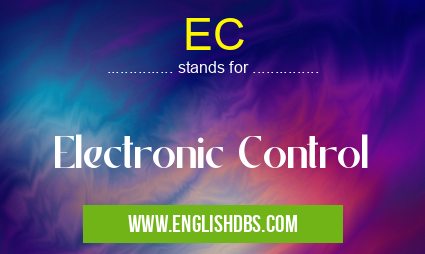What does EC mean in ELECTRONICS
EC stands for Electronic Control. It refers to the electrical systems used to automate and monitor industrial and commercial processes. EC systems involve the use of electronic components and computer technology to control and optimize various operations.

EC meaning in Electronics in Academic & Science
EC mostly used in an acronym Electronics in Category Academic & Science that means Electronic Control
Shorthand: EC,
Full Form: Electronic Control
For more information of "Electronic Control", see the section below.
Components of EC Systems
- Sensors: Collect data on temperature, pressure, flow rate, and other process parameters.
- Controllers: Analyze sensor data and generate control signals based on predefined algorithms.
- Actuators: Receive control signals and perform physical actions, such as opening or closing valves, starting or stopping motors.
- Human-Machine Interfaces (HMIs): Allow operators to monitor and interact with the EC system.
Benefits of EC
- Enhanced process control: Improved precision and accuracy in maintaining desired process parameters.
- Increased efficiency: Optimization of processes to reduce energy consumption and waste.
- Improved safety: Automation of hazardous or repetitive tasks, reducing risks for personnel.
- Reduced maintenance costs: Predictive maintenance and remote monitoring capabilities minimize downtime.
- Enhanced data analysis: Tracking and analysis of process data for performance optimization and troubleshooting.
Applications of EC
EC systems are widely used in various industries, including:
- Manufacturing
- Energy production
- Building automation
- Automotive
- Healthcare
- Transportation
Essential Questions and Answers on Electronic Control in "SCIENCE»ELECTRONICS"
What is Electronic Control (EC)?
Electronic Control (EC) refers to the use of electronic components to regulate and manage various aspects of a system or device. It involves the application of computer technology, microcontrollers, and sensors to monitor, analyze, and adjust system parameters in real-time.
What are the benefits of using EC?
EC offers numerous benefits, including:
- Enhanced Efficiency: EC systems optimize system performance by precisely controlling energy consumption, reducing waste and improving efficiency.
- Improved Precision: Electronic controls enable fine-grained control over system parameters, resulting in greater precision and reliability.
- Increased Flexibility: EC systems can be easily reconfigured and updated, allowing for adaptability to changing conditions or requirements.
- Enhanced Diagnostics: Electronic controls provide detailed data and diagnostics, facilitating troubleshooting and preventive maintenance.
How does EC differ from traditional mechanical controls?
EC systems differ from traditional mechanical controls in the following ways:
- Automation: EC systems automate control functions, eliminating the need for manual adjustments or intervention.
- Data Processing: EC systems leverage advanced algorithms and data processing capabilities to analyze system behavior and optimize performance.
- Digital Communication: EC systems communicate digitally, enabling real-time information exchange and remote monitoring.
What industries use EC?
EC is widely adopted across various industries, including:
- Manufacturing: Optimizing production processes, reducing downtime, and improving product quality.
- Energy: Managing power distribution, reducing energy consumption, and increasing efficiency.
- Automotive: Enhancing vehicle performance, fuel efficiency, and safety features.
- HVAC: Regulating temperature and humidity levels, maximizing comfort and energy conservation.
What are the future trends in EC?
Ongoing advancements in EC include:
- Artificial Intelligence (AI): Integration of AI algorithms for predictive analysis and automated decision-making.
- Internet of Things (IoT): Connectivity and data exchange with other devices and systems for enhanced control and optimization.
- Wireless Sensors: Deployment of wireless sensors for remote monitoring and data collection.
Final Words: EC systems play a crucial role in modern industrial and commercial operations by automating and optimizing processes. They provide enhanced control, improved efficiency, and increased safety. As technology advances, the capabilities and applications of EC systems continue to expand, making them essential for efficient and reliable operations in various industries.
EC also stands for: |
|
| All stands for EC |
